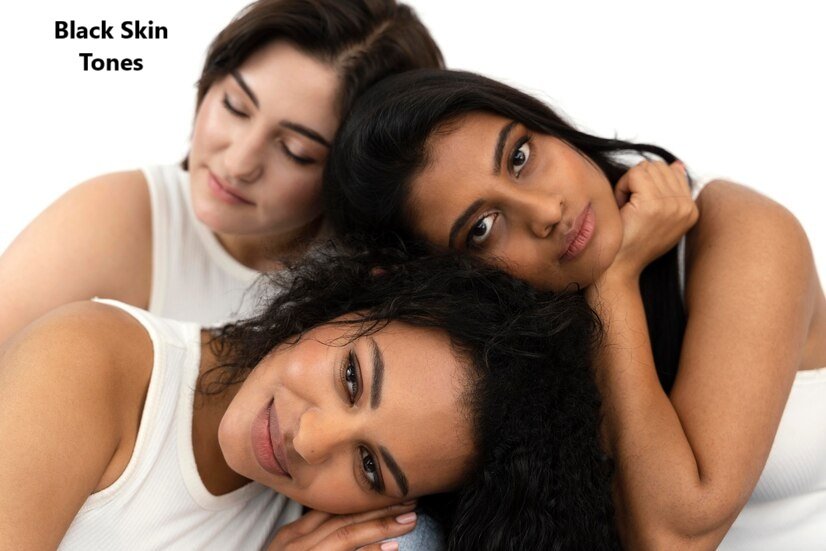
Black Skin Tones
Skin tone is one of the most distinguishing features of human beings, influencing how we perceive ourselves and how others perceive us. Among the wide spectrum of human skin tones, black skin tones stand out due to their rich diversity and cultural significance. From the deep, rich hues to the lighter shades of brown, black skin tones encompass a broad range of colors and undertones, each beautiful in its own right.
This article aims to explore the various nuances of black skin tones, from their unique characteristics to the factors influencing them. We will also delve into skincare tips, the role of representation, and the beauty of Embracing one skin tone. Let’s celebrate the beauty of black skin tones in all their diverse forms.
What are Black Skin Tones?
Black skin tones refer to the range of dark hues found in people of African, African-American, Afro-Caribbean, and Afro-Latinx descent, although people from other regions can have dark skin tones as well. These tones can range from very deep, almost blue-black shades to lighter brown hues, and each skin tone comes with its own set of characteristics, including undertones, texture, and sensitivity.
Factors Influencing Skin Tone
- Melanin: The primary factor that determines skin tone is melanin, a pigment produced by cells called melanocytes. Melanin absorbs ultraviolet light and helps protect the skin from harmful sun exposure. People with darker skin tones have more melanin in their skin, which provides greater protection from sunburn and skin damage compared to those with lighter skin tones.
- Genetics: The genetic inheritance of skin tone is complex. It involves multiple genes that control the production and distribution of melanin. While the primary determinant is melanin levels, a person’s ancestry, family heritage, and geographical location can influence their skin tone.
- Geographical Location: Historically, people who lived closer to the equator developed darker skin tones due to higher sun exposure. The increased melanin content offered protection against UV radiation. In contrast, those living in higher latitudes with lower sun exposure tended to have lighter skin tones, as less melanin was needed.
- Environmental Factors: Environmental factors such as climate, diet, and lifestyle can also influence the appearance of skin tone. For instance, a person who spends a lot of time in the sun may develop a tan, which can give a deeper hue to their skin. Additionally, certain skincare practices and products can also alter the appearance of one’s skin.
Range of Black Skin Tones
Black skin tones are incredibly diverse, varying from very light brown to deep, rich, and dark tones. Below, we’ll discuss the different categories and characteristics of these skin tones:
1. Light to Medium Brown Skin Tone
Light to medium brown skin tones are common among individuals of African descent, especially those from regions with milder sun exposure. These tones range from golden browns to warm, rich hues. People with this skin tone often have an even complexion that radiates warmth.
- Undertones: Light to medium brown skin tones often have undertones of yellow, peach, or gold, giving the skin a warm and glowing appearance.
- Common Characteristics: These skin tones tend to tan easily in the sun and have moderate to high levels of melanin. The complexion may show little contrast between the skin and the underlying bone structure, resulting in a smooth, healthy look.
2. Deep Brown Skin Tone
Deep brown skin tones are rich and full of depth, often seen in people with African, Afro-Caribbean, and Afro-Latinx heritage. These tones range from warm cocoa brown to shades of mahogany and dark bronze.
- Undertones: Deep brown skin may have red, blue, or purple undertones, which can create a striking, luminous appearance.
- Common Characteristics: People with deep brown skin often have a smooth texture and less visible pigmentation issues. However, this skin tone may require more maintenance to keep the skin hydrated and healthy due to its higher melanin content.
3. Dark to Black Skin Tone
This category represents the darkest skin tones, commonly referred to as “black” skin. These tones can range from a deep ebony color to a rich, blue-black hue. People with dark skin tones have the highest concentration of melanin, which provides significant protection from the sun.
- Undertones: Dark skin tones often have deep blue, purple, or red undertones. These tones can sometimes appear shiny, especially when the skin is well-moisturized.
- Common Characteristics: Dark skin can sometimes have a higher likelihood of hyperpigmentation or scarring due to the intense production of melanin. However, it also tends to be more resistant to sunburn, and the skin is often thicker, which can help in maintaining a youthful appearance for longer.
Understanding Undertones in Black Skin Tones
In addition to the basic color of the skin, undertones are a crucial aspect of black skin tones. Undertones are the subtle hues that exist beneath the surface of the skin and can influence how colors appear on your skin.
- Warm Undertones: These skin tones often have hints of yellow, peach, or golden hues. People with warm undertones tend to look radiant when wearing gold jewelry and earthy tones like orange, brown, and red.
- Cool Undertones: Cool undertones include hints of pink, blue, or purple beneath the skin. People with cool undertones may look best in silver jewelry and cool colors like blue, lavender, and emerald green.
- Neutral Undertones: People with neutral undertones have a balanced mix of both warm and cool tones. They can wear a wide range of colors without it clashing with their complexion.
Understanding undertones is essential when choosing makeup products, clothing, and accessories to enhance one’s natural beauty.
Skincare Tips for Black Skin Tones
Black skin requires special care due to its unique characteristics, including higher melanin levels and varying sensitivity to environmental factors. Here are some skincare tips for maintaining healthy and radiant black skin:
- Moisturize Regularly: Darker skin tends to be more prone to dryness, especially in colder climates. Use a rich moisturizer that contains natural oils like shea butter, coconut oil, or jojoba oil to keep your skin hydrated.
- Sun Protection: While black skin offers some protection from UV rays due to higher melanin content, it is still vulnerable to sun damage. Use a broad-spectrum sunscreen with SPF 30 or higher to protect against skin aging and hyperpigmentation.
- Exfoliate Gently: Exfoliating helps remove dead skin cells and reveals fresh, glowing skin. Use a gentle exfoliator to avoid irritation, which can lead to scarring or pigmentation issues.
- Treat Hyperpigmentation: Black skin is more prone to hyperpigmentation, such as dark spots and scars. Use brightening products that contain ingredients like vitamin C, niacinamide, or licorice extract to reduce uneven skin tone.
- Healthy Diet: A diet rich in antioxidants, vitamins, and minerals can improve skin health. Include foods high in vitamin E, omega-3 fatty acids, and antioxidants to support skin regeneration.
- Hydration: Drink plenty of water to keep your skin hydrated from the inside out. Proper hydration can also help reduce the appearance of fine lines and wrinkles.
The Role of Representation and Beauty in Black Skin Tones
In recent years, there has been a cultural shift towards celebrating black beauty in all its forms. Historically, black skin tones were often underrepresented or portrayed negatively in media and fashion. However, through movements such as Black is Beautiful and the rise of influencers and models who embrace their natural beauty, the world is beginning to appreciate the richness and diversity of black skin tones.
Representation matters because it helps individuals feel seen and celebrated for who they are, fostering confidence and self-love. When people with black skin tones see themselves reflected positively in advertisements, movies, and social media, it reinforces the idea that all skin tones are beautiful and worthy of love.
Conclusion
Black skin tones are incredibly diverse and beautiful, each hue and undertone contributing to the uniqueness of an individual appearance. Whether light, medium, deep brown, or dark black, black skin is resilient, radiant, and deserving of care and appreciation.
Understanding and embracing the richness of black skin tones can help individuals take better care of their skin, celebrate their beauty, and confidently wear their natural shades. It is essential to promote inclusivity, representation, and self-love in every aspect of society so that all individuals, regardless of skin tone, can feel valued and beautiful. Embrace the uniqueness of your skin tone and always remember that it is not just the shade of your skin that makes you beautiful, but the confidence with which you wear it.
Also, Read, Lancome Skin Feels Good: The Ultimate Guide to Radiant and Natural-Looking Skin.





